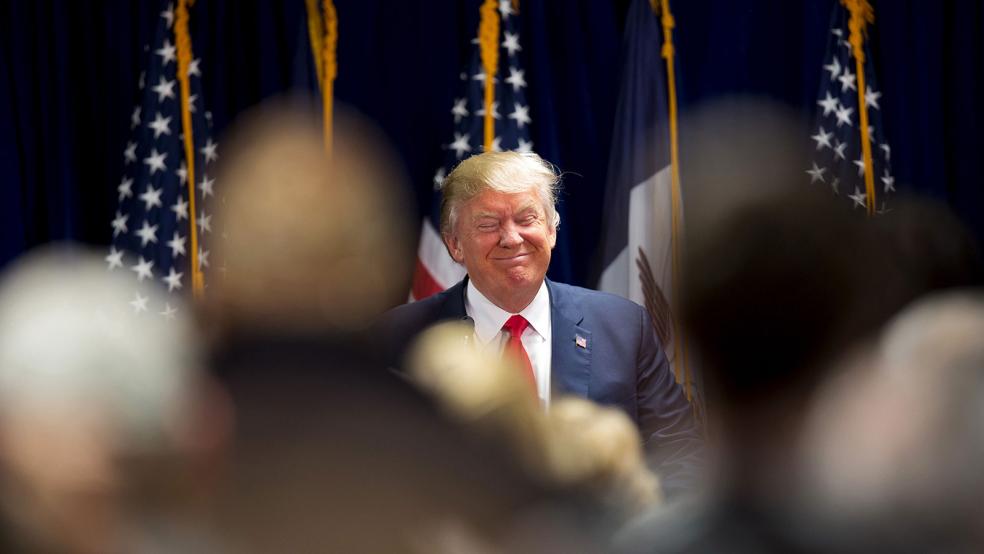The hot-button issue of how the U.S. ought to deal with refugees from Syria and other countries touched by terror groups affiliated with or sympathetic to ISIS has created a defining moment in the race for the Republican presidential nomination. And, like most major blow-ups in the GOP primary this time around, the man at the center is Donald Trump.
The billionaire and former reality television star, who sometimes appears to be running for the office of xenophobe-in-chief has said that he “absolutely” supports the creation of a database that would track all Muslims in the United States. That comes a day after he signaled that he is at least open to other things, like warrantless searches of Muslims, the government closing down mosques, and requiring Muslims to carry special identification cards.
Related: Is Trump on a Slippery Slope to Fascism?
“We’re going to have to do things that we never did before,” Trump told Yahoo’s Hunter Walker. “And some people are going to be upset about it, but I think that now everybody is feeling that security is going to rule. And certain things will be done that we never thought would happen in this country in terms of information and learning about the enemy. And so we’re going to have to do certain things that were frankly unthinkable a year ago.”
Trump’s comments stood out, even at a time when some of his fellow candidates had called for a “Christians only” policy of accepting refugees, another compared refugees to a pack of dogs that might include some with rabies, and another proposed a federal agency in charge of promoting Judeo-Christian values.
His rivals don’t have to react to every crazy statement that comes out of Trump’s mouth, but anybody with ambitions to lead the U.S. has a responsibility to weigh in when a leading candidate for one party’s presidential nomination proposes suspending the civil liberties of a group of citizens on the basis of their religion in a way that has, very understandably, drawn comparisons to Nazi Germany.
Depressingly slowly, the other candidates have started to react to Trump’s ideas, some forcefully, some in a notably wishy-washy manner.
Related: Bernie Sanders Wants a New NATO – Including Russia – to Fight ISIS
In an appearance on CNBC Friday morning, former Florida governor Jeb Bush, one of those in favor of a “Christians only” refugee policy, criticized Trump’s statements, but not without taking a none-too-subtle dig at the religion of Islam.
“There are no Christian terrorists wandering around the world trying to take out peace-loving Muslims. This is a serious problem.” However, he added, “it does not mean we should be disrespectful of Muslims in our country or anything like that. In fact, I find it abhorrent that Donald Trump is suggesting we register people….You're talking about internment, you're talking about closing mosques, you're talking about registering people, and that's just wrong, I don't care about campaigns. It's not a question of toughness, it's manipulating people's angst and their fears; that's not strength, that's weakness.”
Ohio Gov. John Kasich, the candidate who promised a federal “Judeo-Christian values” agency, criticized Trump for trying to “divide people,” saying the database plan in particular “strikes against all that we have believed in our nation's history.”
Texas Sen. Ted Cruz, another “Christians only” candidate, offered a weak, “I’m not a fan of government registries of American citizens.”
Related: Here’s How Obama Could Win the Fight Over Syrian Refugees
Florida Sen. Marco Rubio doesn’t appear to have directly addressed the database issue just yet, but he has backed the idea of shutting down places where Muslims worship – even places where they gather – if it can be shown that it is “being used to radicalize and inspire attacks against the United States.”
Retired neurosurgeon Ben Carson, the source of the comparison of refugees to dogs, had not, as of noon on Friday, appeared to address Trump’s suggestion directly.
Many candidates in the field have been unwilling to spend time attacking Trump, some because they hope to gain his supporters’ votes if he collapses and leaves the race, and some because Trump’s withering personal attacks against his rivals have in several cases had a devastating effect on poll numbers.
But how the current crop of White House aspirants reacts to Trump now – not what they say about him months from now, when he’s safely out of the way (assuming he doesn’t actually win the nomination) – should be a, well, huge factor in how voters assess their fitness for office.





